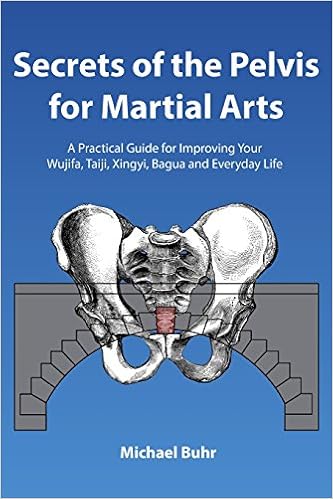As I develop my ability to feel kinesthetically, I feel isolated feelings in specific body areas; lower back, shoulders, legs, arms. Mechanically, the next step is to connect these isolated feelings and discover…. This is where I am now. But will this approach lead to internal strength?
Here we go. Let's first look at the Wujifa Zhan Zhuang Alignment:
The method for Zhan Zhuang alignment in Wujifa is called “One Two Three Four, One Two Three Four”. The two sets of One Two Three Four are different and complementary sets of alignment points.
The first One Two Three Four consist of aligning feet, knees, hips, and shoulders over imaginary parallel lines.
The second One Two Three Four consists of the following four points:
- Inguinal crease "in"
- Tailbone and lower back relaxed and sinking "downward"
- With the spine straight and the rib heads relaxed, the sternum drops "downward" without hunching the back or shoulders.
- The head relaxes "back and upward", maintaining a natural relaxed curve through the cervical vertebrae.
Using the 1,2,3,4 - 1,2,3,4 method above as an example, the Mechanical Man learns Zhan Zhuang by considering each alignment point individually which may be illustrated in a “building block” fashion.
An evolution of the Mechanical Man approach is to notice the feeling at each alignment point. How does “1” feel? How does “2’ feel? Etc… Evolving further, the question becomes: How do I connect these isolated, feelings? Instead of feeling “1” then “2” then checking back in on “1”, and then on “2” again, sequentially, how do I feel “1” and “2” together, simultaneously, as its own feeling?
So now I am working on connecting the individual, isolated feelings and noticing maybe a new “combined” feeling.
Finally, I may be able to connect the previous "combined" feelings.
Does this approach then result in whole-body internal strength? I’ve got internal connection throughout my entire body, right? Well, maybe and maybe not. Maybe I will develop some initial connections. Maybe I will reach a dead end since there are no more mechanically isolated parts to connect.
Alternatively, consider the Growing a Seed Paradigm. Yes, there are the components, seed, soil, water, air, but there is also a certain sense as to how to nurture the seed given the nature of those components and the forces acting on those components.
A strict mechanistic approach may get a seed to grow but there may come a situation where the rules don't apply. Then what? Do what feels right? The mechanistic approach may be a way to begin to learn Zhan Zhuang however, this method probably has its limits. Stay tuned!
The bridge from the Mechanical Man Paradigm to the Growing the Seed Paradigm is FEELING. The main and independently-validating feelings of “How do I know if I’m doing good Zhan Zhuang?” are: feeling top-light-bottom-heavy, feeling the coin sized burning in the front center of the thigh, feeling fascial stretch, expansion initially in the lower back.
When you experience something that someone else has not yet experienced, you explain your experience using examples from the paradigm of the inquiring person, “It’s like…” You explain the experience in terms that others can understand. For example, if you've experienced Wu-chi, you might explain it using the Five Elements or Yin-Yang paradigms. However, if you are at the level of knowing only Yin-Yang or Five Elements, you cannot explain Wu-chi.
And so it is with learning Zhan Zhuang and internal strength. There is the experience and then there are the descriptions to help you get the experience; the Wujifa Triangle (Structure, Balance, Relax), the “It’s like…” the Mechanical Man Paradigm, the Growing the Seed paradigm. To learn Zhan Zhuang mechanically (as I have) has taken me this far. At some point, I’ve got to open to deeper and broader feelings to walk the bridge from the Mechanical Man paradigm to the Growing a Seed paradigm.

